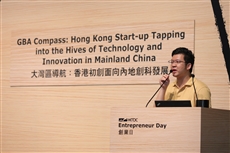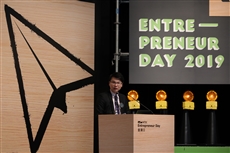Experts highlight start-up opportunities in Greater Bay Area
29 May 2019 − Many young Hong Kong entrepreneurs looking for new opportunities and a broader development space have been encouraged by the raft of start-up support policies initiated since the unveiling of the Outline Development Plan for the Guangdong-Hong Kong-Macao Greater Bay Area (GBA). The 11th HKTDC Entrepreneur Day (E-Day), organised by the Hong Kong Trade Development Council (HKTDC), featured a seminar titled "GBA Compass" at which speakers including Tim Lee, Founder & CEO of QFPay Group, Abraham Lam, Director & CEO of MEGA Automation, and Wing Chu, Business Advisory Manager (Research Department) of the HKTDC, analysed start-up trends in the Greater Bay Area, and shared their experiences and practical tips for start-ups looking to set up in Mainland China.
Capitalise on tailwinds for better results
Tim Lee, Founder & CEO of QFPay Group, recalled that while on a work assignment in Beijing 10 years ago, he gained an insight into the unlimited business opportunities arising from the revolutionary changes smartphones would bring to the mainland, so he decided to quit his job and embark on a new venture. Despite failing twice, Mr Lee did not give up. Eventually, he founded QFPay, a mobile payment company, and in just a few years succeeded in changing the habits of 90% of mainland people to move from cash to mobile payments.
Today, as a global partner of WeChat Pay and Alipay, QFPay has been ranked in the China Leading Fintech 50 listing for two years in a row. The company has operations in 16 countries, and has processed more than 500 billion transactions so far. “Entrepreneurs should always capitalise on ‘tailwinds’, where they will certainly find opportunities and achieve better results for their efforts,” Mr Lee said, adding that the Outline Development Plan for the Greater Bay Area qualifies as a ‘super tailwind’. In this context, the mobile payment business can not only scale new heights, but also facilitate the development of various industries.
Mr Lee said he expected the mainland’s experience in revolutionising payment methods over the past few years will be repeated in other parts of Asia and Africa, which has major implications for entrepreneurs. He also believed that people who are currently without a bank account, who number about 1.7 billion around the world, will get one through mobile payment, which will further boost the development of the industry. “Innovative payment methods are the way I connect the world,” he said.
Six key points for entrepreneurship in Mainland China
Dr Abraham Lam, Director & CEO of MEGA Automation, explained how he has been involved in research work since childhood and now wants to turn the results into real-world solutions. In 2012, when the Buildings Energy Efficiency Ordinance was implemented by the Hong Kong Special Administrative Region Government, Dr Lam was attracted by the huge potential in the market. He set up Mega Automation, which provides smart building energy-management systems, to help Hong Kong customers save energy and enhance their quality of life. In 2015, the company set up its research and development team in the mainland through the Qianhai-Shenzhen-Hong Kong Youth Dream Factory scheme, helping to expand its business into the Greater Bay Area.
Summing up his experience as an innovative pioneer over the past four years, Dr Lam shared several practical tips for Hong Kong people looking to set up scientific research start-ups in the mainland. First, different provinces and cities have their own start-up support policies, including subsidies or grants, and the support available to a company depends entirely on where it is located. Therefore, companies should fully be aware of what local support is available for business development prior to setting up shop there. Start-ups must also not rely on policies such as grants to decide on where to locate because policies will be subject to change. Most importantly, start-ups must consider the sustainability of the industry in which they choose to operate.
Dr Lam also encouraged entrepreneurs to actively participate in mainland entrepreneurship exhibitions and seminars to help build their networks. When explaining their ideas and growth plans, start-ups should build a compelling story into their pitch to make it unique and to highlight the key points. Finally, he reiterated that entrepreneurs must make effective use of mainland social media such as WeChat, while keeping a sharp focus on business development. Matters such as tax filing and customs clearance are best handled by agents.
Seek support in Hong Kong first before going north
Wing Chu, Business Advisory Manager (Research Department) of the HKTDC, explained how a wave of start-up activities has been sweeping the mainland in recent years, with some data showing that the number of tech business incubators in the mainland increased 1.3-fold between 2014 and 2017. That, on top of the introduction of several start-up support policies such as the Outline Development Plan for the Greater Bay Area, present abundant opportunities for start-ups both in the mainland and Hong Kong. “I often hear investors in both places saying that there is no shortage of funds and that they are just waiting for a good plan, which is really good news for start-ups,” Mr Chu said.
Although there are plenty of business opportunities in Mainland China, Mr Chu reminded seminar participants that Hong Kong is also part of the Greater Bay Area and that local entrepreneurs may first consider setting up business from their “home base”. They can learn more about the support offered by various Hong Kong organisations, such as the HKTDC’s seminars, networking activities and business advisory services. He added that mainland provinces and cities each have their own start-up support policies, such as Shenzhen’s Qianhai-Shenzhen-Hong Kong Dream Factory scheme and Guangzhou’s recently introduced subsidy scheme, that are open to eligible Hong Kong entrepreneurs.
Citing HKTDC research, Mr Chu noted that mainland investors particularly value Hong Kong start-ups’ experience and knowledge of overseas technical standards and market information. Therefore, when meeting with potential investors from the mainland, Hong Kong entrepreneurs should focus more on these areas to get better results.
|
|
|
Tim Lee, Founder & CEO of QFPay Group, said that entrepreneurs “should always capitalise on ‘tailwinds’, where they will certainly find opportunities and achieve better results for their efforts”, adding that the Outline Development Plan for the Greater Bay Area qualifies as a ‘super tailwind’. In this context, the mobile payment business can not only scale new heights, but also facilitate the development of various industries |
|
|
|
Dr Abraham Lam, Director & CEO of MEGA Automation, shared that when Hong Kong people look to Mainland China to set up scientific research start-ups, they should fully be aware of whether local support is suitable for business development prior to setting up shop there. Start-ups should not rely on policies such as grants to decide on where to locate, and must consider the sustainability of the industry in which they choose to operate |
|
|
|
Wing Chu, Business Advisory Manager (Research Department) of the HKTDC, reminded people that Hong Kong is also part of the Greater Bay Area, and that local entrepreneurs should learn more about the support offered by different organisations in Hong Kong, such as the HKTDC’s seminars, networking activities and business advisory services |
Media enquiries
Should you have any enquiries, please contact:
|
Ruder Finn Asia: Ivy Chan Tel: (852) 2201 6475/ (852) 6686 9106 Email: Chani@RuderFinnAsia.com |
HKTDC Communications & Public Affairs Department: Angel Tang Tel: (852) 2584 4544 Email: angel.hc.tang@hktdc.org |
Lilian Luk
Tel: (852) 2201 6434/ (852) 9153 8319
Email: Lukl@RuderFinnAsia.com
About the HKTDC
The Hong Kong Trade Development Council (HKTDC) is a statutory body established in 1966 to promote, assist and develop Hong Kong’s trade. With 50 offices globally, including 13 in Mainland China, the HKTDC promotes Hong Kong as a two-way global investment and business hub. The HKTDC organises international exhibitions, conferences and business missions to create business opportunities for companies, particularly SMEs, in the mainland and international markets. The HKTDC also provides up-to-date market insights and product information via trade publications, research reports and digital news channels. For more information, please visit: www.hktdc.com/aboutus.




